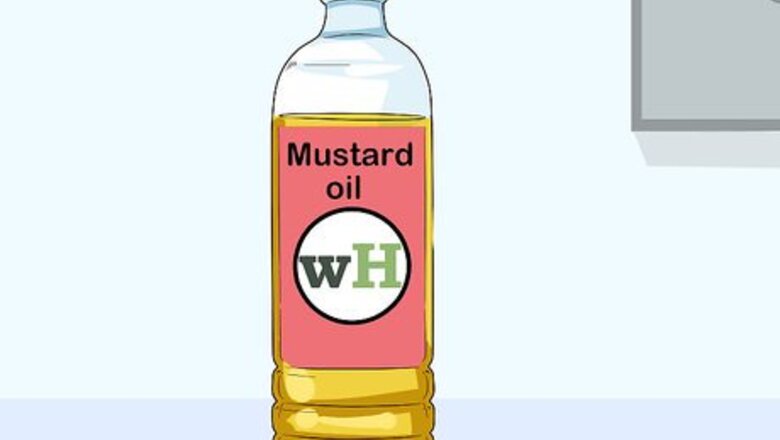
views
Going Darker with Mustard Oil
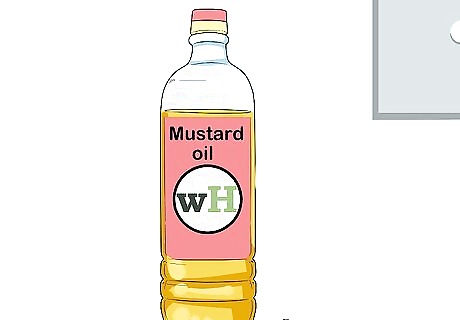
Purchase some mustard oil. You should be able to find it at a specialty spice shop or a grocery store that carries Indian and South Asian food products. Be sure to the purchase the cooking oil (preferably cold-pressed), not the essential oil: essential mustard oil can irritate the skin. Stop using the oil immediately if your experience any skin irritation. You may even want to perform a patch test (placing a coin-sized amount of the oil behind your ear) 48 hours before using the oil. You might also find mustard oil in the international foods aisle at your local grocery store.
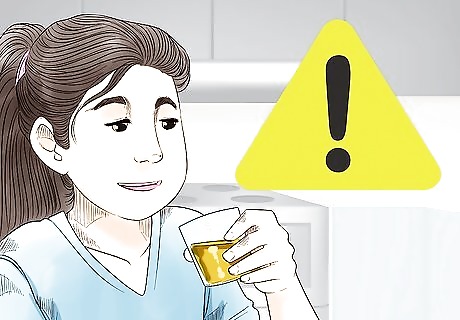
Note that mustard oil is for external use only. Mustard oil is banned for edible consumption in the EU, USA, and Canada. The oil is high in erucic acid, which can cause heart problems, anemia, and increase the risk of lung cancer.
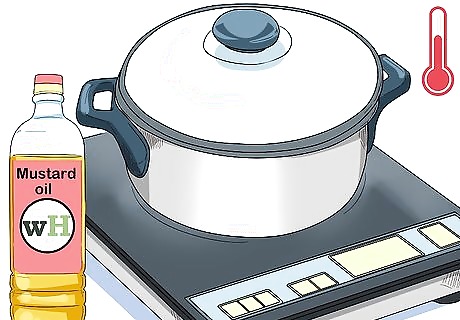
Warm up the mustard oil. Before placing the oil on your hair, place it in a small bowl and warm it up slightly in the microwave or in a small pot on the stovetop. Be careful not to heat it up too much: just slightly warmer than room temperature is fine. If you didn’t warm the oil up in a bowl, transfer it to one after you’ve warmed it up and bring it over to where you’ll be applying the oil to your hair.
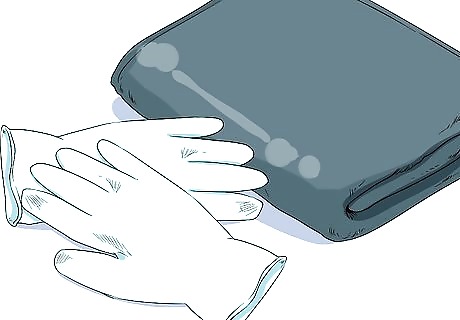
Protect your clothes, skin and work area from staining. The oil could stain your clothes, skin and work area. Take the following precautions: Be sure that you’re wearing old clothes or at least a towel over your shoulders to protect your clothes. Wear gloves to protect your hands from being stained by the oil. Apply a layer of petroleum jelly or a thick moisturizer over your neck, ears and hairline to protect them from being stained. Cover your work area in newspaper or old towels.
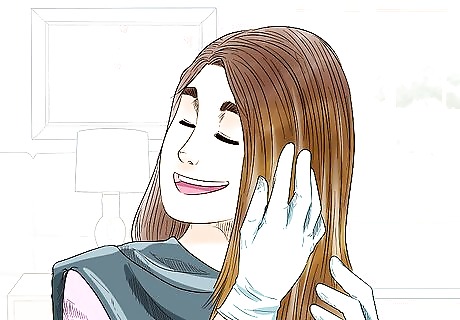
Apply the mustard oil to your hair. Start with the ends of your hair. Once your ends are saturated with oil, work your way up towards your roots. Ensure that the oil is evenly applied to your hair as you go by gently massaging the strands between your fingers and/or hands. You can apply the oil with your hands, with a hair dye application brush, or with a bottle applicator, which is made for runny products. You can purchase a hair dyeing brush or a bottle applicator at a drugstore or beauty supplies shop.
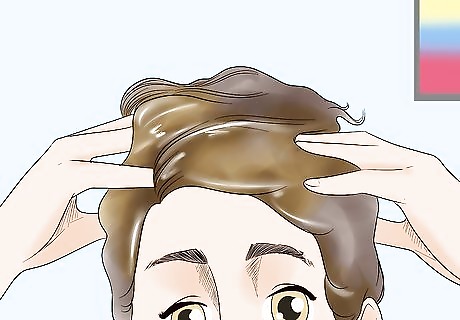
Massage the oil into your scalp. Once you’ve reached your roots, give yourself a scalp massage. This will help moisturize your scalp. Many people claim that rubbing mustard oil into your scalp can also promote hair growth, but there is little to no scientific evidence for this.
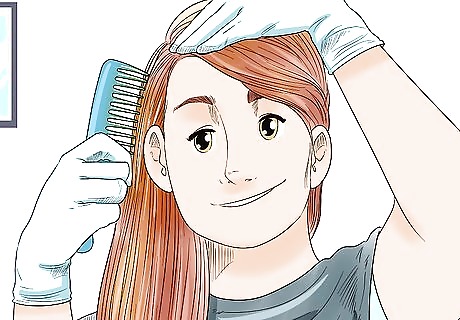
Ensure that the oil is evenly distributed. Work your hands through your hair to make sure that all of your hair is evenly covered with oil. Running a wide-toothed comb through your hair will help ensure even distribution.
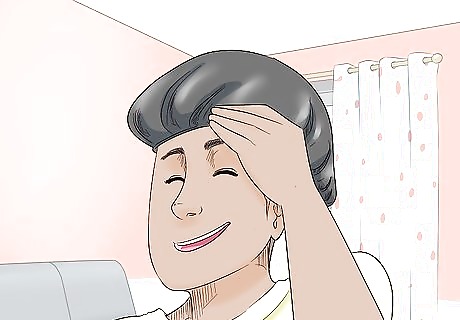
Wrap your hair in a shower cap. In a pinch you can also fashion a plastic grocery bag into a cap around your hair.
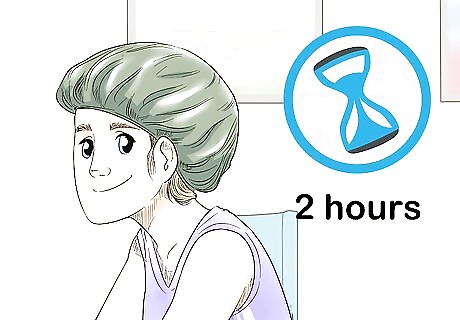
Leave the oil on for at least two hours. The oil needs time to soak into your hair. You can even leave it on overnight.
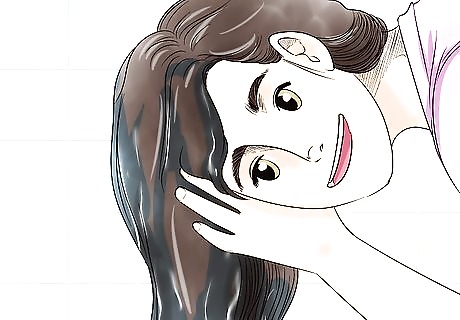
Wash your hair. Wash your hair with a mild shampoo. You may need to wash it twice to get the oily feeling out. As your hair will likely still have some oil in it, you may want to forget the conditioner lest it make your hair look greasy. If you really want to use conditioner, apply only a small amount to the bottom half of your hair.

Repeat up to three times a week. You can apply mustard oil to your hair up to three times each week.
Going Darker with Amla Powder
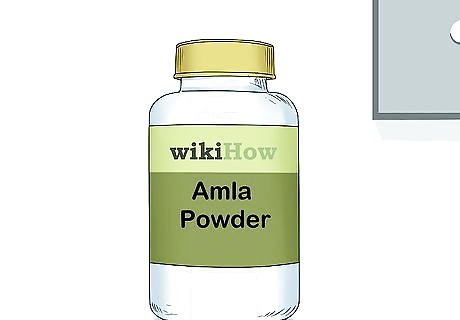
Purchase amla powder. Amla powder — a powder made from Indian gooseberries — is easy to find for online, but may be more difficult to find in your local shops. If you would prefer to buy it in person, you may be able to find it in shops that carry Indian products or natural/herbal products.
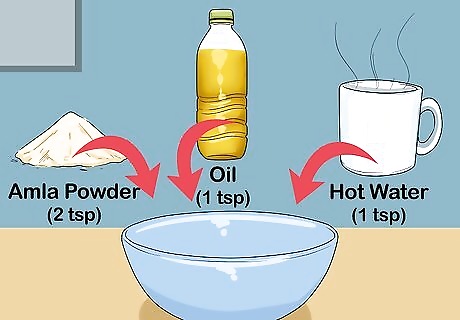
Make a paste from the amla powder. Place 2 teaspoons (9.86 ml) of amla into a bowl. Then, add 1 teaspoon (4.92 ml) of any oil to the bowl— many people use coconut oil. Next, add 1 teaspoon (4.92 ml) of water to cover the amla and oil — hot water is recommended. Stir the ingredients together so that the mixture is smooth.
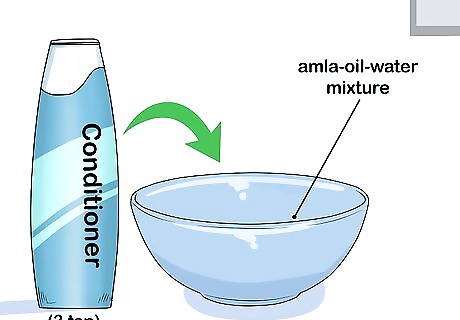
Add conditioner to the amla-oil-water mixture. Measure out 3 teaspoons (14.8 ml) of conditioner and add it to the mixture. If you have very long hair, you might want to double or even triple the amla-oil-water-conditioner recipe. Use a ratio of 2 parts amla, 1 part oil, 1 part water, and 2 parts conditioner.
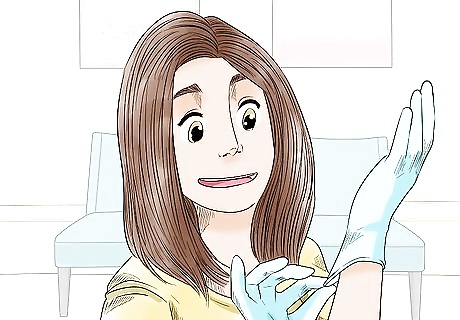
Ensure that you’re wearing protective clothing. As amla does have darkening properties, wear clothes that you don’t mind being stained. You can also just put a towel over your shoulders if you’re confident that you won’t spill any of the mixture on your pants or socks.

Wet and divide your hair into sections. If you've washed your hair in the last 48 hours, then you needn’t wash your hair, as you’ll be shampooing the mixture out afterward. If it's been more than 48 hours since you've washed your hair, then your natural oils can prevent the amla from absorbing.

Add the mixture to your hair. Spread the amla-conditioner mixture into your hair as you would a conditioning treatment. Ensure that it’s evenly distributed, paying special attention to your scalp and the ends of your hair. Amla has strong antioxidant qualities that make it very good for your scalp, so take time to give yourself a bit of a scalp massage while the mixture is on your head!
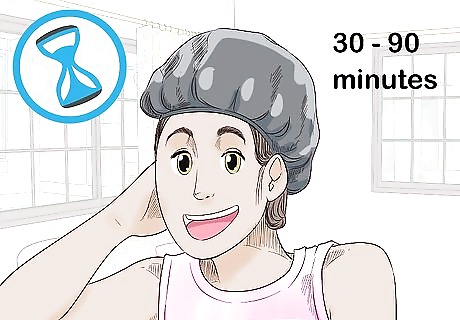
Leave the mixture on for 30 to 90 minutes. You may want to put a shower cap or plastic bag over your hair to protect your furniture and clothes.
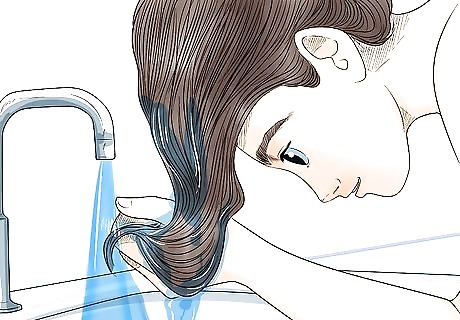
Wash your hair. Use lukewarm water to cleanse away the mixture. Hot water can remove some of the color.
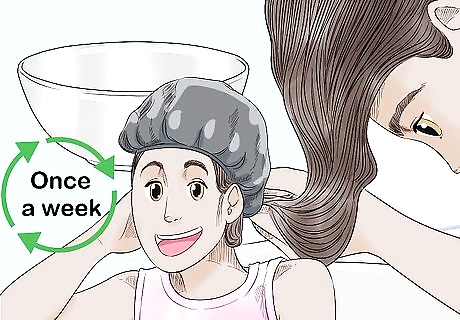
Repeat once a week. Amla has only very mild darkening effects; it could take time for any results to show. In general, amla powder is more widely known for its moisturizing and thickening properties. It is more common to use amla in conjunction with henna, to aid with darkening and moisturizing the hair.
Going Darker with Henna Powder
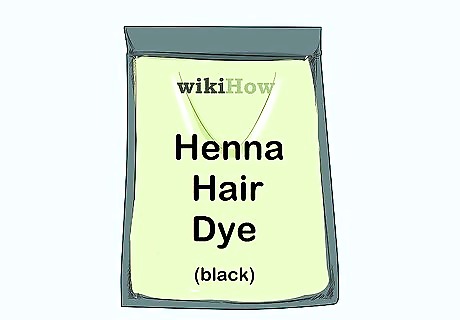
Purchase henna hair dye. You can purchase henna hair dye from a number of retailers — both in person and online. Most natural foods stores and even some drugstores will carry henna hair dye. Many people swear by the hennas sold at shops that carry Indian products as these are believed to be purer. If you buy henna from a natural foods or drugstore, read the ingredients to ensure that it only contains natural ingredients. Some manufacturers combine henna with the harmful chemicals commonly found in regular hair dyes. Note that pure henna powder will dye your hair a reddish brown color. If you’re looking to go dark brown or black, it will likely have other plants (for example, indigo) in it. Just be sure to read the label to make sure that all of the ingredients in the package are natural! If you want to use henna, remember that it is a vegetable dye, so it cannot be removed from your hair or lightened with bleach or other dyes.
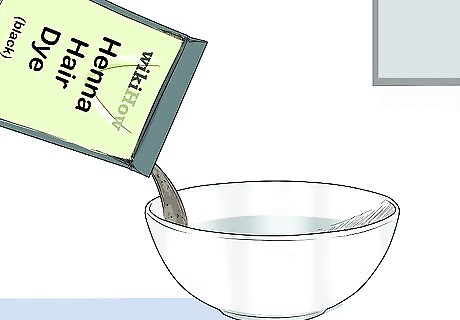
Gather your other materials. You’ll need a stain-proof bowl to mix the henna paste in, plus a whisk to mix the henna paste with. You’ll also need hair clips to section off your hair as you apply the paste, gloves to protect your hands, and a hair dye application brush. You will also need something to cover your hair once the henna is on: shrink wrap is a popular choice, but a shower cap or plastic bag will also do.

Protect your clothes, skin and work area. Dyeing your hair with henna can be quite messy. Wear clothes that you don’t mind getting stained. At the very least, cover your shoulders with an old towel. To prevent the henna from staining your skin, rub petroleum jelly or a thick moisturizer around your forehead, neck, and ears. Protect your workspace with some newspapers or old towels.
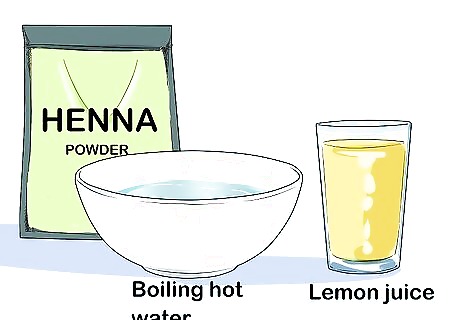
Make a paste with the henna powder. How you make this paste will depend upon the manufacturer’s instructions, how much henna you need, and what color you’re going for. Common ingredients for a basic henna paste are boiling hot water, lemon juice, and the henna powder. The texture you want is similar to mashed potatoes. Some henna manufacturers require that you let the paste sit for several hours before applying. Read the instructions that came with your henna package to see if you need to let it sit.
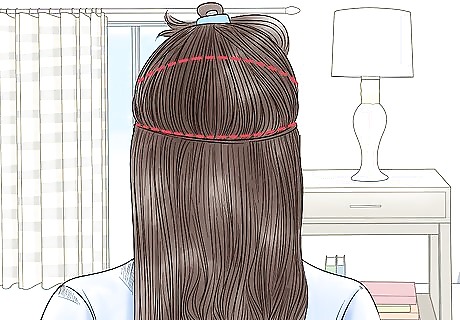
Divide your hair into sections. Use hair clips to divide your hair into sections. How many sections you need to divide your hair in depends on your hair’s thickness and length. Aim for at least six: two at the nape of your neck, two near the center of your head, and two at the top.
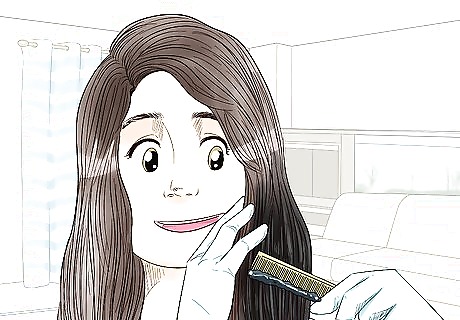
Apply the henna paste to your hair. With your gloves on and starting at the base of your neck, apply the henna paste to your hair. With each section of hair, start at the ends and work up to the roots. Once you’ve applied the paste to a section, clip the section back up so that it’s out of the way of the other sections of hair. Be sure that you add a lot of paste to each section of hair. You want your hair to be fully saturated. You might find it helpful to apply the henna with a hair dye application brush. If it’s too chunky for the brush, don’t worry! It’s also okay to apply it with your (gloved!) hands.
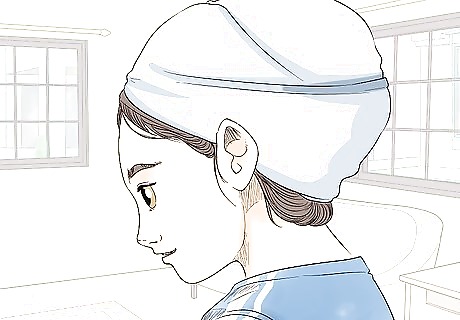
Wrap your head. Many people recommend using plastic wrap to cover the henna after it’s been applied. If you don’t feel comfortable doing this, you can also use a shower cap or a plastic grocery bag. The key is to ensure that your hair is covered and close to your head. Wrapping your head is very important because it will keep the henna from drying out, which would make it stop working.
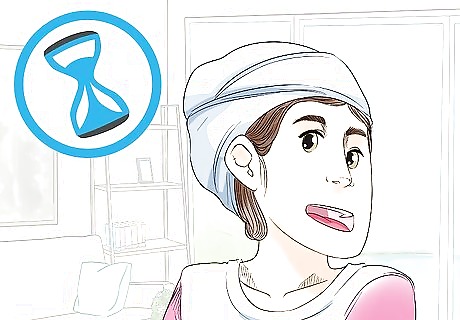
Wait. How long you let the henna sit on your hair will depend on the manufacturer's instructions and how intense you want your color to be. You will likely need at least a couple of hours. Some people even leave it on overnight.
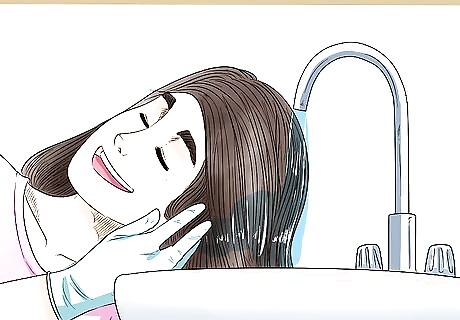
Wash it out. Make sure that you’re wearing gloves for this part, otherwise your hands will get stained. Once you’ve rinsed all of the henna out of your hair, you can shampoo and condition it as normal. You might find it more effective to wash your hair in the sink or under the faucet in the bathtub. It will be pretty messy as chunks of henna come out of your hair, which is why many people prefer not to do it as they shower.
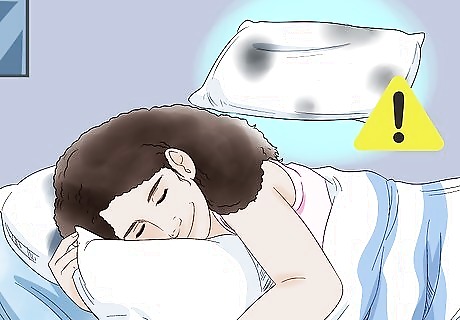
Be careful of staining. In the first few days after you’ve dyed your hair with henna, the color may rub off on pillow cases and clothes, so be careful about where you put your head until you’ve washed your hair a few times!
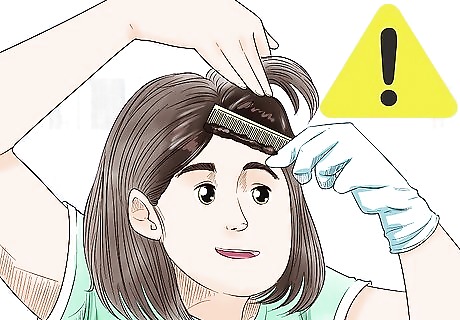
Avoid overuse of henna. If you use henna too often, it can dry out your hair and will build up on your ends, making them very dark and dull. Instead of doing an all-over application, just touch up your roots.
Using Walnut Shells
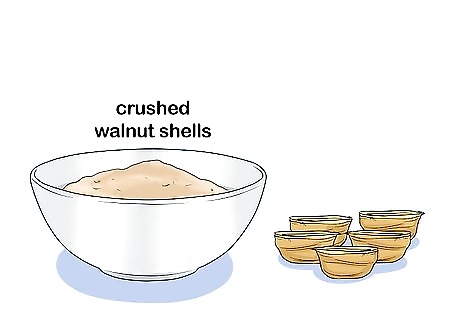
Crush the walnut shells. Use discarded walnut shells or buy a walnut powder to use in place of the shells. The more shells you use, the more concentrated your color will be.
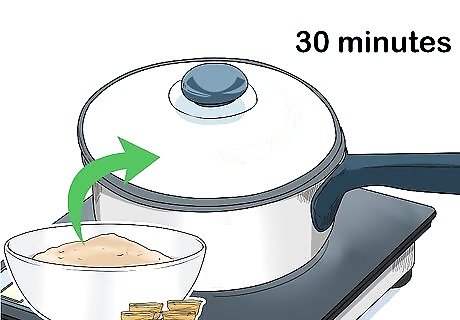
Boil the walnut shells for half an hour. Place the shells in a pot and cover them with water. Boil them on high for 30 minutes.
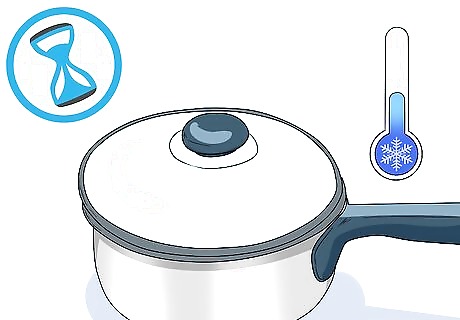
Allow the water to cool. You can let the water sit out to cool, or you can place it in the refrigerator to speed up the process. You must let it fully cool before handing it because you could burn yourself.
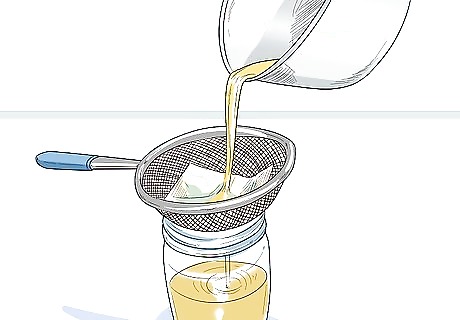
Strain out the water into a container. You will be using the tinted water to darken your hair, so strain it into a container that you can use. Remember that the water will dye anything it touches, so be careful not to spill it or get it on your skin.
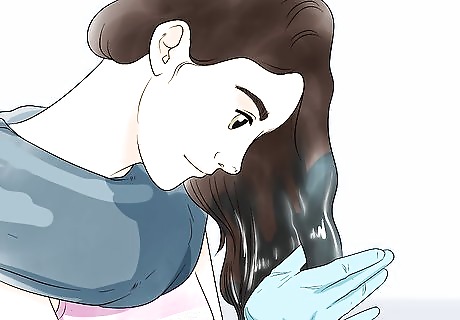
Apply the tinted water to your hair. Use your dye applicator brush, squeeze bottle, or a cotton ball to apply the tinted water. Make sure that it thoroughly covers your hair.
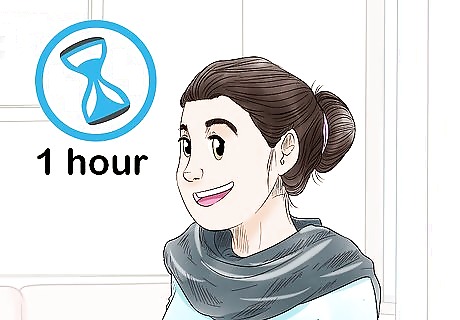
Allow it to sit for one hour. Give the product an hour to soak into your hair. If you want a really dark shade, let it sit for longer. The longer you wait, the darker your hair will be.
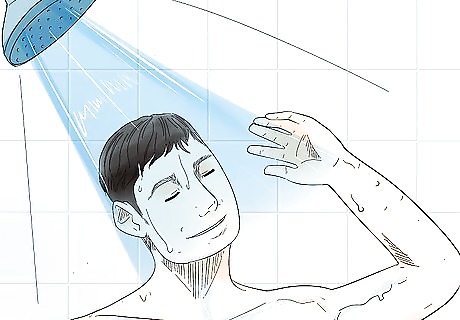
Wash in lukewarm water. Hot water can wash out some of the color, so wash in lukewarm water instead. Continue to wash your hair in lukewarm water to maintain your darker color.
Going Darker with Conditioner
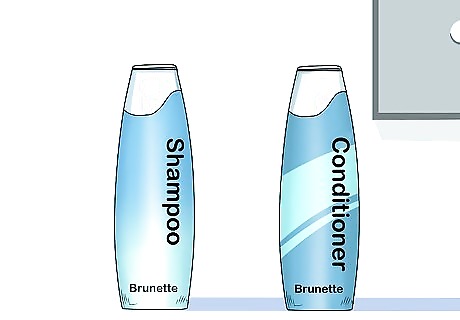
Purchase a shampoo and conditioner made for brunette hair. Use the darkest shade possible. These products will bring out your highlights and deepen your darker tones if you already have brunette hair. You can purchase these products at most drugstores. Some hair salons might have more effective (but also more expensive) versions.
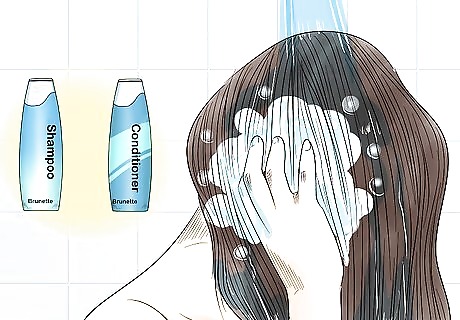
Wash and condition your hair as normal. Use the brunette-specific hair products as your regular shampoo and conditioner.
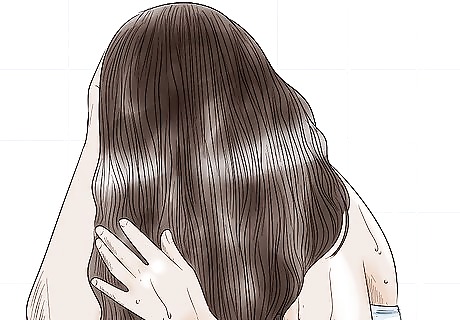
Repeat. The more you wash your hair, the sooner you’ll see results. If you wash your hair every day or two, you should see results within one to two weeks.
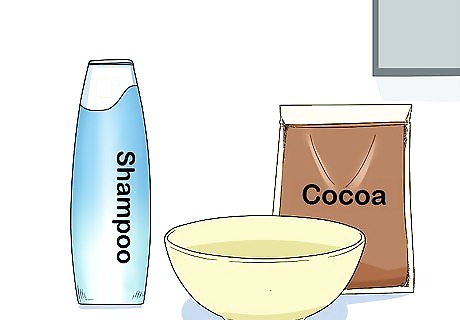
Add cocoa powder to your shampoo. If you don’t want to buy brunette-specific shampoos, many people claim that you can darken your hair by adding cocoa powder to your shampoo at roughly a 1:1 ratio. Fill a bottle 1/2 full with shampoo and 1/2 full with cocoa powder, then shake it vigorously until the two are completely mixed together.
Going Darker with Black Tea
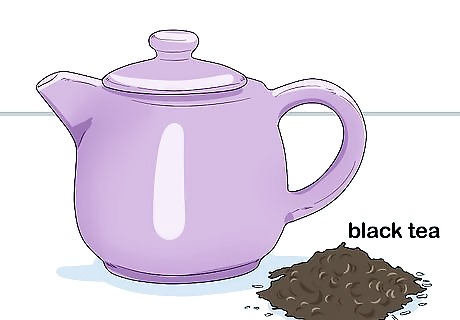
Make a strong pot of black tea. Allow it to cool down to a temperature where you can put your fingers into the tea and move them around without it hurting.
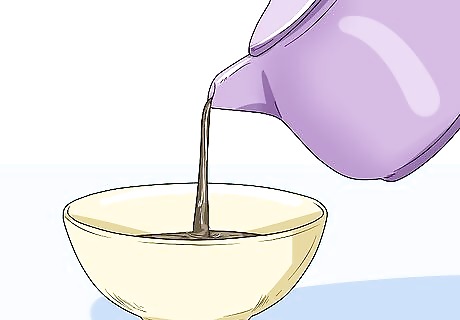
Place the black tea in a large bowl. Ensure that the bowl is large enough that you can fit your hair into it.

Soak your hair in the tea for about 15 minutes. Allow the product time to absorb into your hair.
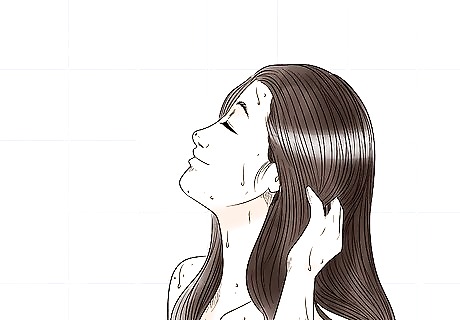
Wash your hair. Rinse the product from your hair using lukewarm water.
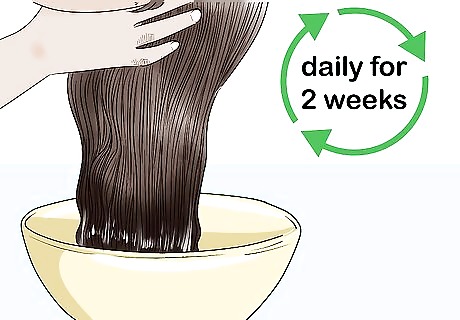
Repeat every day for two weeks. It will likely take about two weeks for your hair to look darker. After that, you may be able to maintain the color by soaking your hair once a week. Depending on the quality of your hair, it could return to its lighter color sooner.
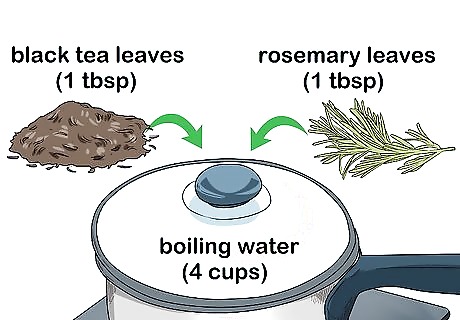
Try a variation. A variation on this method is to steep 3 heaping tablespoons (44.36 ml) of loose black tea leaves and 1 heaping tablespoon (14.79 ml) of rosemary leaves in 4 cups (960 ml) of boiling water for about 45 minutes then let it cool. After shampooing and rinsing your hair, pour the mixture over your hair. Let it sit for at least 30 minutes under a plastic cap, then rinse it out with lukewarm water.
Going Darker with Coffee

Brew a strong pot of coffee. Add enough water for roughly 3 cups of coffee. Add at least double the amount of ground coffee that you would normally use for drinking.

Let the coffee cool down. Be careful not to burn yourself. You can allow the coffee to cool down at room temperature, or you can place it in the refrigerator to cool it quicker.
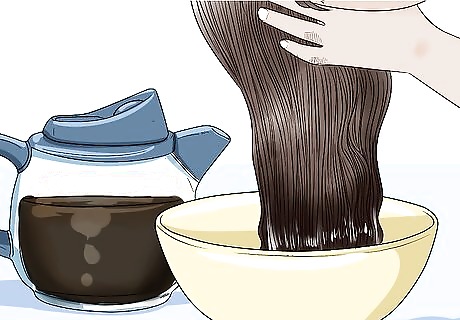
Dump the coffee over your hair. Place your head in the sink or stand in the shower, then rinse your hair at least three times with the coffee. Another method would be to pour the coffee into a large bowl and then dip your hair into it and hold it there for several seconds.
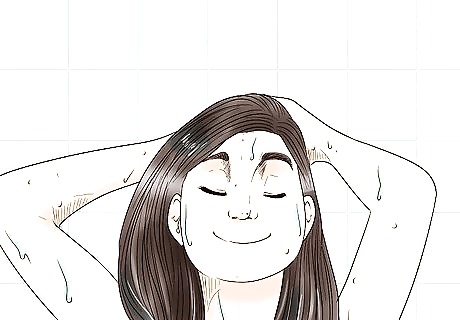
Wash and rinse your hair. Remove the coffee from your hair using lukewarm water.
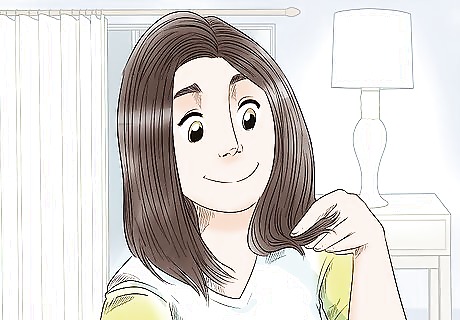
Repeat. You should find that your hair becomes a couple of shades darker each time you follow this method.
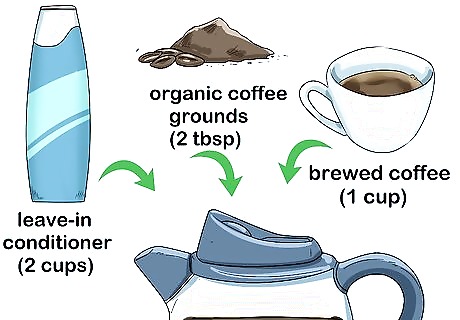
Try a variation. Mix 2 cups (480 ml) of leave-in conditioner with 2 tablespoons (29.57 ml) of organic coffee grounds and 1 cup (240 ml) of brewed coffee (ensure that the coffee is cold first!). Add this to your hair and leave it in for about an hour before rinsing it out.
















Comments
0 comment